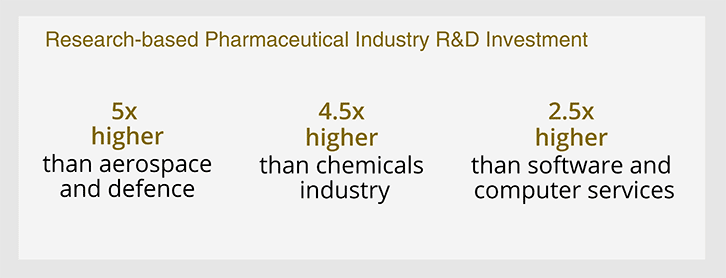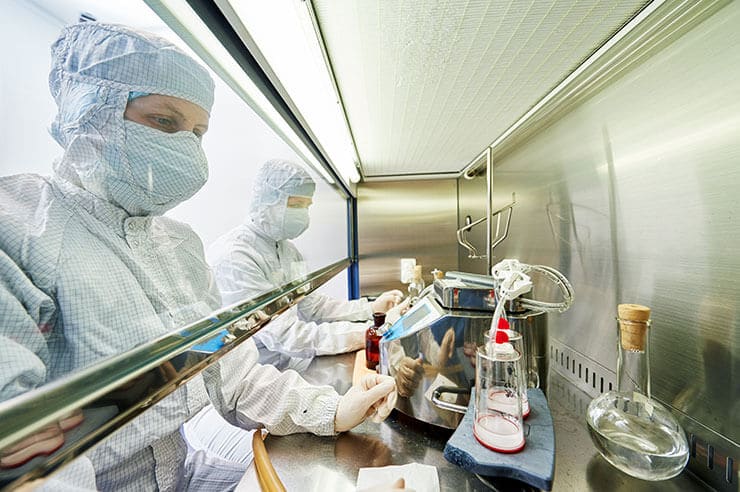There are a huge variety of careers available in the pharmaceutical industry from laboratory-based research and development, clinical trials, regulatory affairs, manufacturing, engineering, quality assurance, quality control, validation all the way through to marketing, sales and distribution. Almost any skill set will find a career to match.
On this page you’ll find:
- What is pharmaceutical manufacturing?
- Closely related industries
- What types of jobs are there in the pharmaceutical industry?
- How much can I earn in pharmaceutical manufacturing?
- What qualifications do I need to work in the pharmaceutical industry?
- What are typical pharmaceutical industry career paths?
- 5 great reasons to choose a pharmaceutical career
- What are the next steps?
Click on a link above to jump straight to that section, or scroll down to read them all!
Pharmaceutical Industry Courses
BTW, if you are interested in a new career in pharma or want to upskill for a promotion, check out our Pharmaceutical Courses
But before we begin…
Pharmaceutical manufacturing is the making of medicines on an industrial scale.
For a medicine to get to the manufacturing stage, it has already gone through all research and discovery phases, and has been thoroughly tested. The manufacturing stage is about following the same “recipe” to create the same medicine again and again.
For this reason, manufacturing medicines isn’t really about science, it’s about systems. It’s about following processes and checking quality. This helps to make sure that the products are the same every time they’re made so that patients can rely on their medicines. For a tablet product, the manufacturing process can be broken down into a series of steps:
Chemical Synthesis:
Combining chemicals together to make the “raw medicine” (the part that has the medical effect on a patient). This is known as the Active Pharmaceutical Ingredient or API.
Formulation or preparation:
The medicine is then mixed with other ingredients (known as pharmaceutical excipients) that are needed within the final the product. Different pharmaceutical excipients serve different purposes in the final medicine.
Examples include making sure it’s protected and stable enough to be packaged and get to the patient, making sure the API can be used by the patient’s body, or making sure the tablet is identifiable (which is important for patient safety). Processes like milling and granulation also happen here.
Tablet compression:
Shaping the final mix of ingredients into pills.
Tablet coating:
Often done to protect the pills and make them easier for a patient to swallow.
All stages of pharmaceutical industry operations are closely regulated and monitored by bodies such as the US Food & Drug Administration (FDA) and the European Medicines Agency (EMA).
This level of regulation ensures that products are made safely and correctly, every single time. Which is important, there doesn’t get to be “good” batches and “not so good” batches of medicine… for obvious reasons! Because of this, pharmaceutical manufacturing is a unique and highly regulated environment.
Check out this video from AstraZeneca for an overview of the pharmaceutical manufacturing process…
If you’re considering this type of manufacturing career, there are some related industries that might also be of interest. These industries rely on the same strict regulations and specialist training…
Pharmaceutical Manufacturing
The traditional idea of medicines – made using chemical synthesis, as outlined above. Making small active molecules from scratch and ‘packaging’ them in a way the body can use (like in a tablet). The painkiller aspirin is a great example.
Biopharmaceutical Manufacturing
Biopharmaceutical products are made using a biological process (things we see happening naturally in biology, think alcohol fermentation which is used to make beer or wine). At its simplest, biopharmaceuticals are capturing things that are produced in biology and finding a way to make them into a usable medical treatment.
The processes here take larger, naturally occurring molecules such as proteins, genes, and cells and (again) ‘package’ them in a way that the body can make use of.
For a closer look at manufacturing biologics specifically, check out the video below. It’s a little science-heavy at the very start but gives a great overview of the manufacturing process as it progresses.
Nutritionals:
A segment of the pharmaceutical industry that involves the research, development, and manufacturing of nutritional products (such as milk powder for babies).
Medical Devices Manufacturing
Also referred to as Medical Technology (or MedTech). This is a wide encompassing term for any product, instrument, or item that is used to diagnose, prevent, treat, or cure health conditions without any chemical or pharmacological action on or within the body. Examples include heart monitors, blood glucose meters, surgical equipment, artificial joints or even contact lenses.
Combination Products:
These are products that combine a medical device and a pharmaceutical/biopharmaceutical product. An example would be drug eluting stents, prefilled drug delivery systems (syringes, EpiPen, insulin injector pen, metered dose inhaler).
There are a huge variety of job roles available within a pharmaceutical company, and almost any skillset will find a place in this industry.
The specific types of roles can generally be broken down by department. Let’s think of the departments we’d need to make a brand new drug, and the order we’d need them…
Research & Development:
Typically working in labs to identify new molecules that could be used in medications, how known molecules can be “packaged” into medicines, or on improving currently available medications.
Job roles include – Scientist, Senior Scientist, Principal Scientist, Research Scientist (it’s likely a specialism will be mentioned in the title — e.g pharmacology, neuroscience, oncology etc.) Biochemist, Microbiologist, Product Development Scientist, BioMedical Scientist
Clinical Trials:
Clinical trials are research studies performed on a drug to establish or check its safety and effectiveness.
Before a medical product can be prescribed by doctors or sold to patients, it needs to be approved by regulatory bodies (such as the FDA). These bodies give approval based on the outcomes of clinical trials – a company needs to show that their product is safe to be used, and has the desired effect.
Early clinical trials are done in labs, then with a small number of people (to test safety), then with a larger number of patients who have the condition the product aims to treat (to test effectiveness).
Job roles include – Clinical Scientist, Clinical Research Associate, Epidemiologist. People with a background in pharmacy, pharmacology, or healthcare (e.g. nurses) can also often find roles here.
Regulatory Affairs:
This department deals with the applications and ongoing paperwork surrounding regulations that have to be done before/when a medicine is sold to the public.
Job roles include – Regulatory Affairs Specialist, Regulatory Affairs Officer, Regulatory Affairs Associate, Qualified Person
Pharmacovigilance:
This area deals with monitoring and reporting the effectiveness and any side effects of pharmaceutical products after they have been released to the public.
Job roles include – Pharmacovigilance Officer, Drug Safety Officer
Production/Manufacturing:
The team of people who operate the machinery and systems that actually produce the pharmaceutical product. In a typical manufacturing plant, this is approximately 50% of total staff.
Job roles include – Process Engineer, Production Supervisor, Manufacturing Engineers, Instrumentation Engineer, Process Technician, Chemical Process Technician, BioProcess Technician, Cleanroom Operator, Manufacturing Technician, Production Operator, Manufacturing Operator, Packaging Operator
Science Roles that Support Development and/or Manufacturing:
Development roles include the “D” part of “R&D”. Development is the phase after research where the creation of a proven drug is moved from the lab to the manufacturing plant.
Job roles include – Tech Transfer Scientist Jobs, Process Technology Transfer Scientist, Transfer Scientist, Product and Process development scientists
Other science roles support the manufacturing process and work within multidisciplinary teams to produce medicinal products.
Job roles include – Microbiology/Particle Analyst, Process Sciences Manager-Upstream, Environmental Microbiologist, Bioprocessing Scientist, Production Scientist, Senior Scientist Technical Support, Process Scientist / Specialist – Purification
Validation:
The department that assesses and documents all equipment and processes to ensure that an action, process, or system leads to a consistent and reproducible result. (Check out this article for a much more detailed look at pharmaceutical validation).
Job roles include – Validation Engineer, Validation Technician, Validation Team Member, CQV Engineer, CQV Specialist, Validation Specialist, Senior Validation Specialist, C&Q Specialist, Cleaning Validation Engineer, Process Validation Engineer, Process Validation Specialist, CSV Engineer, CSV Specialist.
Quality Assurance:
QA is process-oriented and focuses on removing any variation from the processes of manufacturing. This is achieved by creating, revising, and strictly implementing a set of precisely defined procedures and quality standards that, when followed exactly, ensure the final quality of the product.
Quality Assurance is preventative by nature and makes sure things are done “Right first time”.
Job roles include – Quality Engineer, Quality Assurance Specialist, QA Technician, Documentation Specialist, Document Controller, Documentation Coordinator, Quality Assurance Associate, Quality Associate Manager, Plant Quality Assurance Senior Associate, QA Specialist – Raw Materials, QA Compliance Specialist, QMS/QA Specialist, QA Internal Auditor, QA Compliance Manager, Quality Systems Coordinator
Quality Control:
QC is product-oriented and focuses on testing samples from the manufacturing process to make sure they meet the required specifications and standards. In pharmaceutical manufacturing, the sample testing is done in a laboratory so people who work in QC usually have a science/laboratory background.
Job roles include – Quality Control Analyst, Quality Control Specialist, Senior Quality Control Analyst, QC Associate, QC Technician, Quality Control Microbiology Analyst, Quality Control Analyst FTC, QC Analyst, QC Scientist, QC Micro Technician, QC Microbiology Analyst, QC Drug Product Technologist, QC Specialist -LIMS
Operations:
The group of people that ensures the continuous functioning of a manufacturing plant and its equipment. People in this department often come from a wide range of backgrounds, bringing specific skills sets with them.
Job roles include – Maintenance Technician, Calibration Technician, Electrical and Instrumentation Technician, Facilities Engineer, Automation Engineer, Project Engineer, Maintenance Engineer
Sales and Marketing:
This department is focused on advertising and promoting the company’s pharmaceutical products in line with all relevant rules and regulations.
Other:
There are still many other job roles within a pharmaceutical company, including areas such as:
- Supply Chain
- Logistics
- Human Resources
- Warehouse
- Finance, etc.
The size of any of the departments discussed above will depend upon the size of the company (smaller companies may outsource some of these roles altogether), but they are all ultimately critical roles within a successful pharmaceutical company.
Click here for more in-depth information on the structure and departments in a pharmaceutical manufacturing company.
Check out our pharmaceutical job description and salary section to get an idea of the typical salaries for roles within pharmaceutical manufacturing.
Or click on one of the links below jump straight to salaries related to different work experience backgrounds…
The type of qualification you need is going to vary hugely on the types of roles you wish to pursue.
For Science/Laboratory roles you’d generally need a Degree or Masters in Chemistry, BioChemistry, or Microbiology (or related fields) and may also need a doctorate, depending on the role.
For Clinical Research/Clinical Trials roles again, you’d typically need a Degree, Masters, or Phd in Chemistry, BioChemistry, Pharmacy, Pharmacology, or Microbiology (or related fields). Medical doctors or those with healthcare qualifications (e.g. nursing) are also needed here.
For Engineering roles, you’d generally need a Degree or Masters in an engineering discipline such chemical, mechanical, process, project, automation/instrumentation & calibration, quality, or manufacturing engineering.
For Manufacturing/Production operator roles, you might previously have gotten these jobs without any third level qualifications but more recently pharma and med device companies are looking for people with academic qualification at a certificate or diploma level in science or manufacturing discipline. Please note that this requirement does vary widely between companies.
For Validation roles, you’d typically need a qualification in an engineering discipline such mechanical, process, quality, or manufacturing engineering, or related field. A background such as pipe welder/fitter or in instrumentation, supported by an appropriate certificate can also be an accepted.
For Maintenance roles, you’d generally need a Diploma Degree or Masters in an engineering discipline such mechanical, automation, instrumentation, calibration, process, project quality, or manufacturing engineering. For entry level technician roles the requirement will be lower, relevant work experience accompanied by knowledge of the industry can be accepted.
For Quality Assurance roles, you’d generally need a Diploma Degree or Masters in an engineering discipline such chemical, mechanical, process, project quality, or manufacturing engineering.
For Quality Control roles, you’d typically need a Diploma, Degree or Masters in Chemistry, BioChemistry, or Microbiology (or related fields) depending on the role. A background in lab/science can also be sufficient, when supported by specific knowledge of the industry rules and regulations.
In Manufacturing/Production:
Operator > Senior Operator > Shift supervisor > Production Manager > Production Director
In Engineering:
Engineer > Senior Engineer > Engineering Manager > Engineering Director
In Maintenance:
Maintenance Technician > Maintenance Engineer > Maintenance Supervisor
In Quality:
Quality Technician > Quality Engineer > Quality Supervisor > Quality Manager > Quality Director
In Science/Laboratory:
Senior Laboratory Technician > Team Leader Technician > Laboratory Manager
In Validation:
Validation Technician > Senior Validation Technician > Validation Engineer > Validation Team Leader > Validation Manager
1. The pharmaceutical industry is growing
Worldwide pharmaceutical industry revenues have shown excellent growth for many years. The graph below was published in 2016 and shows the growth in revenue since 2001 (at $390bn) and also shows projected revenue for 2018 and 2021 ($1.4tn).
Worldwide pharmaceutical industry revenues have shown excellent growth for many years with revenue increasing from $390bn in 2001 to a project $1.4tn in 2022 were $1.4tn and is estimated to grow at an annual pace of 5% per year until 2025.
Even during difficult financial times for other industries, the pharmaceutical and medical device industries have been resilient.
At a company level, the biggest pharmaceutical companies (based on 2022 revenue for pharmaceutical drug sales) are:
- Pfizer – $81.3 billion
- Abbvie – $56.20 billion
- Johnson & Johnson – US$52.80 billion
- Novartis – $51.60 billion
- Roche – $48.47 billion
Click here for more information about the world’s 15 largest pharmaceutical companies.
2. This growth has led to well paying jobs
Worldwide employment across these industries grew from 3.64 million in 2006, to 5.5 million in 2024.
And, possibly more importantly for those considering a mid-career change into pharmaceutical manufacturing, these jobs pay well.
According to the BLS, the annual mean wage in Pharmaceutical and Medicine Manufacturing was $74,560 per year. And for engineering or laboratory graduates, the average salary is over $100,000 per year.
Compared to the national average, across all industries, which was $58,265.
In Ireland, people working in these industries earn approximately 30% more than the national average salary.
3. It doesn’t suffer from cyclical ups and downs
As previously mentioned, even in the most difficult of financial times, the pharmaceutical and medical device industries have maintained success. A good measure of this success is how much money is invested in research and development.

The relatively high amount of money being allocated to research and development compared to other industries, is a good sign of industry stability.
And that investment into R&D is necessary when you consider that to get a new drug to market takes 12-13 years and costs an estimated $2.56 billion.
4. It offers rich opportunities for career growth
With so many companies operating within the pharmaceutical and medical device industries, there are lots of opportunities to progress in your new career, if you want to.
Companies in these industries also tend to be found in clusters—when many companies grow within a small geographic location.
Some of the biggest pharmaceutical industry clusters include:
- Ireland – Main pharma hubs in Ireland are Cork, Dublin, Limerick, Waterford, Galway (Medical Devices)
- United Kingdom
- Germany
- The Netherlands
- Switzerland
- Singapore
And in the United States:
- Chicago, USA
- Pennsylvania, USA
- Raleigh-Durham, North Carolina, USA
- Seattle, USA
- San Diego, California, USA
- New Jersey, USA
- Maryland / Virginia / DC Metro
- LA/Orange County, California, USA
- San Francisco Bay Area, California
- Massachusetts, USA
Check out the top pharmaceutical and medical device manufacturing hubs in the US.
Being near such a cluster means that once you are “in” and skilled, there are likely to be a number of companies close by that you’d be suitable for.
5. You can leverage your previous work experience
There can often be a misunderstanding about the skills needed to successfully begin a career in pharmaceutical or medical device manufacturing.
Not necessarily needed:
- Science degree
- Multiple years of pharmaceutical industry experience
- Experience in a lab
Also welcomed:
- Engineering experience from another industry
- Manufacturing experience from another industry
- Experience in maintenance
- Demonstrated technical skills
No experience?
You’ll need to start with our Conversion Course into Pharma Manufacturing
Experience in GMP regulated manufacturing environment e.g. pharma, med device, nutritional, beverage, food or dairy manufacturing?
Check out our university-accredited Certificate in BioPharmaChem program
Experience in lab/science, biochemistry, microbiology, molecular biology, biotechnology?
Take our Conversion Course into Pharma for Scientists
Experience in quality, pharmacy, pharmacy technician or food science?
Take our Conversion Course into Quality Roles in Pharma
Pharma experience and looking to move into more specialist roles?
Our Equipment Validation Training Course – for starter validation, CQV and C&Q roles
Not Sure
View all 13 of our Pharmaceutical Industry Courses
About the Author
Claire Wilson
Content Marketing and Career Coaching
Claire runs GetReskilled’s Advanced Career Coaching Programme – our specially devised job hunting course that helps our trainees take that final step into employment by leading them through the job hunting process. She is extremely enthusiastic about helping people reach their final goal of employment in their new career path.
Claire has a BSc (Hons) in Medical Biology from Edinburgh University and spent 7 years working in the pharmaceutical and medical device industries.
Donagh Fitzgerald
Head of Marketing & Product Development
Mechanical/Production Engineer
Donagh looks after the marketing and product development including the training and pedagogical elements of our programs and makes sure that all GetReskilled’s users can have a great online learning experience. Donagh has lived and worked in many countries including Ireland, America, the UK, Singapore, Hong Kong and Japan. Donagh has also served as the Program Manager for the Farmleigh Fellowship based out of Singapore.
Donagh holds Degrees in Production Engineering and Mechanical Engineering from South East Technological University, Ireland.



Amazing opportunities to grow, and as I’ve worked in the health sector and as a ward-clek in Dublin top hospitals and as a care assistant feel that this would be a good sector for me to get into as I want a rewarding career.
Hi Olga,
The sector is booming in Ireland at the moment. The number of open job positions on our jobs board has doubled in the last 3 years.
Do follow up with me if you have any specific questions.
Hi Donagh, just seen your taking questions . I am a 19 year old living in the midlands in Ireland relatively near many pharmaceutical companys. I am currently trying to decide a career path and am seeing electrician/maintenance technician apprenticeship jobs in Pfizer. This is something i think id be interested in and especially as you said the sector in Ireland is booming. I was just wondering about career progression and what the actual need for a full time electrician is in a site like so? Many thanks
Hi Adam,
Probably the main career path for electricians would be to move into maintenance tech roles. You could also look at moving into calibration and instrumentation roles. Also, you could also look at moving into electrical engineering or automation engineering but you will have to go university for those kinds of roles. Actually, I do know one person who finished his apprenticeship as an electrician and went back to college to complete his degree in automation engineering with TU Dublin.
Longterm, it’s hard to say. There will always be a need for maintenance work within a pharmaceutical plant including electrical maintenance but I really couldn’t comment on the number of jobs available as it’s not something we’d track ourselves.
Hi Olga,
Many thanks for the comments.
I am fully aware of this, however with a BSc (hons.) In chemistry and Molecular Biology as well as a MREs in global and infectious diseases. I am continuously rejected as a good candidate due to lack of experience. And I am now in a situation where j do not see a way out as there is very little opportunity for people like me .
Hi Rasa,
Perhaps you could pop me over a copy of you CV and I’ll see if there is anything I can advise you with. You can see a blue circle on the bottom right on our website. Just go there, click on it to open it up, then leave you name and upload you CV.
Best wishes
GetReskilled Team
Here in Africa the industry is still young but promising for those interested.
Hi Rasa,
If you are still finding it difficult, try registering with an agency and taking a starter role as its one way of getting in.
Hi Patrick,
Where abouts in Africa are you suggesting?
Pol
Hi,
I am holding a masters degree in Pharmaceutics and currently working as Document Specialist for regulatory submissions. I have been trying to get an opportunity to work in Europe but unable to succeed. Please suggest.
Hi there,
If you are looking for work within the pharmaceutical manufacturing industry, Ireland would probable be the best location to look in at the moment. Feel free to check out our Industry resource guide to help you find work.https://www.getreskilled.com/pharmaceutical-jobs/job-search/
Thanks a lot Gerard for the suggestion.
Thank for your valuable information really it’s wonderful.